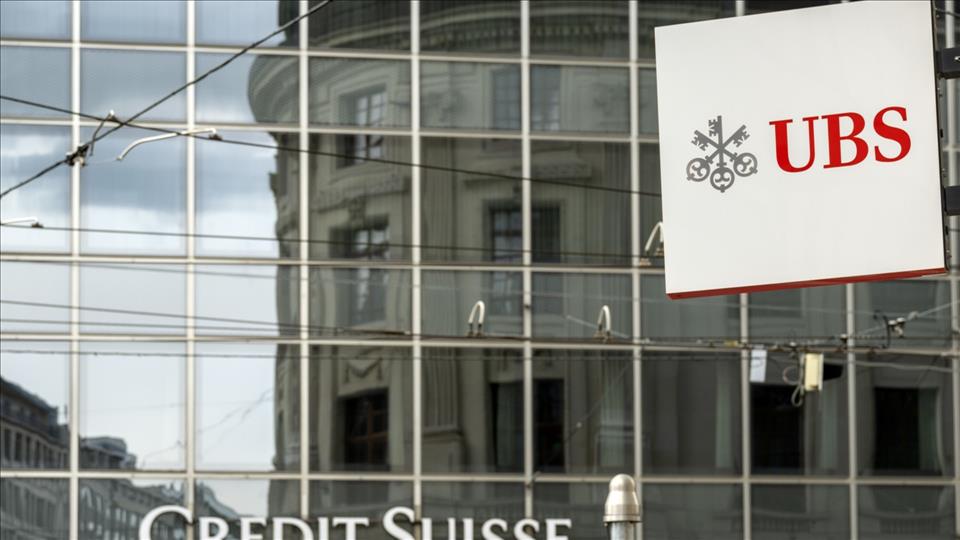(MENAFN- Swissinfo)
When two become one: the fusion of the biggest Swiss banks was announced on March 19. © Keystone / Georgios Kefalas
The deal between Switzerland's two biggest banks, orchestrated by the government in March, will create a giant entity with a balance sheet of $1.6 trillion (CHF1.46 trillion).
This content was published on June 5, 2023 June 5, 2023 Reuters/dos Completion is subject to the registration statement, which covers shares to be delivered, being declared effective by the US Securities and Exchange Commission, and other remaining closing conditions, UBS said in a statement on Monday.
“UBS expects to complete the acquisition of Credit Suisse as early as June 12, 2023. At that time, Credit Suisse Group AG will be merged into UBS Group AG,” it said.
Switzerland's biggest bank agreed on March 19 to pay CHF3 billion ($3.37 billion)and assume up to CHF5 billion in losses for its smaller Swiss rival after a collapse in customer confidence brought it to the brink of collapse, prompting the Swiss authorities to act to stave off a broader banking crisis.
+ read more: why a monster ubs bank scares switzerland
Upon completion, Credit Suisse shares and American Depositary Shares (ADS) will be delisted from the SIX Swiss Exchange (SIX) and the New York Stock Exchange (NYSE), UBS added. SIX said in a separate statement Credit Suisse shares would be delisted on June 13 at the earliest.
Under the all-share takeover, Credit Suisse shareholders will receive one UBS share for every 22.48 shares they held.
Historic dealThe biggest bank deal since the global financial crisis will create a group overseeing $5 trillion of assets, giving UBS overnight a leading position in key markets it would otherwise need years to grow in size and reach.
The mega-bank will employ 120,000 worldwide, although it has already announced it will be cutting jobs to take advantage of synergies and reduce costs.
UBS had been rushing to close the transaction in record time, hoping to provide greater certainty for Credit Suisse clients and employees, and to stave off departures.
The deal was backed by CHF200 billion in liquidity support from the Swiss central bank as well as the government's commitment to swallow up to 9 billion francs in losses on top of those borne by UBS.
“We have to be also clear [...] this is an acquisition not a merger,” UBS CEO Sergio Ermotti told a financial conference on Friday, warning of“painful” cost and job cuts to come.
A question mark remains over what UBS will do with the Swiss retail bank of Credit Suisse, long seen as the group's“crown jewel”.
+ read more: credit suisse to keep name despite takeover
Bringing it into UBS's fold and combining the two banks' largely overlapping networks could produce significant savings.
But there has been public pressure to preserve Credit Suisse's domestic business as a separate entity with its own brand, identity and, critically, workforce.
No nostalgiaThe bank was still analysing the situation, Ermotti said on Friday, although the“base scenario” remained a full integration with UBS and he would not be swayed by“nostalgia” when deciding how to proceed.
The executive, who was brought back to UBS to steer the takeover, rejected concerns the new bank would be too big for Switzerland, saying although scale was important for banks, smaller institutions could also cause problems.
More
More
why switzerland needs workers from abroad
switzerland is an attractive place to work and the country needs specialists. but work permits can be hard to come by.
Articles in this story
why switzerland needs workers from abroad
In compliance with the JTI standards
More: swi swissinfo.ch certified by the journalism trust initiative
You can find an overview of ongoing debates with our journalists here . Please join us!
If you want to start a conversation about a topic raised in this article or want to report factual errors, email us at english@swissinfo.ch .
More
More



















Comments
No comment